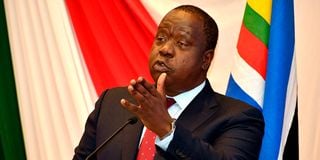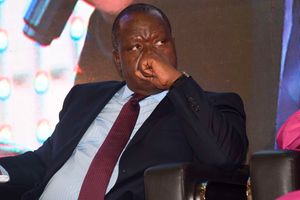
Former Interior and Coordination of National Government Cabinet Secretary Fred Matiangi.
One cold morning in 2018, reality rippled, warped and took a savage spectre when I was summoned with a few other people to the office of then Cabinet Secretary for Education, Dr Fred Matiang’i.
In President Uhuru Kenyatta’s administration, Dr Matiang’i was command central. He was like a flame — fiery, leaping, blue-edged and hypnotic.
At the time, Dr Matiang’i had a bone to pick with us. It was like walking into an angry lion’s den — witnessing the approach of a tempest and the forewarnings of a storm.
We huddled in a semicircle, with him at the head of the table and then the storm broke like a river’s current — tremulous, clamouring and rushing.
He ramped up the ante, making abrupt assertions, shooting off words that ricocheted without prompting, as though he’d been keeping his gun ready, waiting to fire.
The words rolled off quickly from his tongue; the consonants sharp and clipped. There was gravel in voice. He bore down on us as he launched into an eloquent, ruthless scolding.
There was furtive anger on his face, his were eyes aflame as held us in a withering gaze. He is the kind of man that Marcel Proust would have described as one having, “the brisk, decided, undisturbed, and slightly brutal air of a busy surgeon, the face in which one can discern no commiseration, no tenderness… the face devoid of gentleness”.
I felt the temperature drop between us. We felt damned.
Life, in the world of Dr Matiang’i, as CS Education, was lived in one direction, and that direction was forward, only forward even if that would involve breaking things and upsetting the status quo.
There was something about his speed and enthusiasm that gave him a lot of velocity and made things happen with the easy fluidity of running water.
But after President Uhuru left power, Dr Matiang’i faded into the background of Kenyan politics, his dreams billowed, swirled and drifted helplessly to the ground. He is now like an echo of the past, vanquished and benighted.
His career is incomplete and forgotten — battered, bruised and almost snuffed out, constantly under threat and endangered, but there nonetheless.
However, there have been media reports full of stirrings and whisperings that Dr Matiang’i is considering a presidential run in 2027.
Maybe this desire was inspired by some days when in his daydreams, like in a prophetic landscape, the house he was in faded away by occasion of his own longing, and in its place, rising vast, and solemn, and distant before his prophetic gaze, the image of State House looming before him like a vision.
At such times, he is probably overcome by a sensation of floating away, of disconnecting and hovering over the house, probably seeing himself as president even though he is probably smelling the freshness of the vegetation after the rain in the dull, grey late-afternoon sky in his home county of Nyamira, the adamant clouds like wind-driven swirls burnished by sunshine, and somewhere nearby, greenery after greenery, and the constant rain easing into particles of mist swarming about like flies.
The journey from a former CS to presidential candidate is so complex that it only compares to the Greek mythology of the Labyrinth, defined as “a confusing set of connecting passages or paths in which it is easy to get lost”.
In Greek mythology, the Labyrinth was constructed by the master craftsman named Daedalus on the orders of King Minos of Crete. The purpose of the Labyrinth was to contain the Minotaur, a terrifying creature with the body of a man and the head of a bull.
Anyone who entered the Labyrinth was in danger of being devoured by the Minotaur. It was only the Greek hero Theseus who managed to navigate the Labyrinth.
Theseus was given a ball of thread (often called the "clew" or "clue" — probably from where we get “give me a clue” when faced with dilemmas) “to unravel as he ventured into the Labyrinth, allowing him to retrace his steps and escape after defeating the Minotaur”.
Theseus entered the Labyrinth, found the Minotaur, and killed it.
The Labyrinth symbolises the maze of life, through the winding paths that lead to different choices and different futures.
As Dr Matiang’i considers entering the Labyrinth of Kenyan presidential politics, he should consider the complexity of the maze and it’s worth remembering the lessons from the Greek story of the Labyrinth.
The first lesson is that the intricate maze of the Labyrinth represents life’s challenges and choices. As a critic wrote, “Much like navigating a maze, life often presents us with difficult decisions, unforeseen obstacles, and moments of uncertainty”.
The second lesson is that traversing the maze of the Labyrinth takes one into a journey of self-discovery. The challenges, twists and turns help one discover what they can do. This is good for personal growth.
The third lesson is that we must face our fears. The fearsome Minotaur that resided within the Labyrinth symbolises the inner fears we must confront for us to reach our full potential.
By fighting and defeating the Minotaur, Theseus embodies the struggle to overcome our worst fears. For Dr Matiang’i, the dream is indeed valid. However, there is a Labyrinth to traverse to attain his dream.
The writer is a book publisher based in Nairobi.










